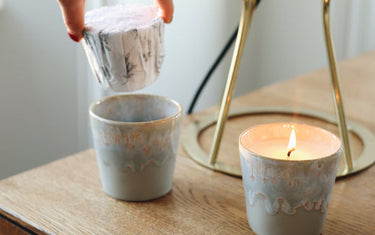5 min read / 28 February 2023 / Laura Garvin Gomez
Jojoba Oil for Face: Benefits for Acne, Wrinkles and More
This popular carrier oil has a heap of useful benefits for our complexions. Find out what makes jojoba such a great addition to your routine.

Many people are under the impression that the words "oil" and "skincare" shouldn't go hand-in-hand - but times are changing.
Sure, having too much oil on your face can lead to clogged pores and acne woes, but that doesn't mean natural oils should be skipped from your routine altogether.
In fact, the recent rise of coconut oil alongside celebrity-approved treatments like rosehip oil have seen a good number of people converting from their oil-free ways to a life of plant-based alternatives.
Jojoba oil, like many other carrier oils of its kind, has also had a spike in popularity amongst dermatologists, scientists, and skincare enthusiasts alike.
We're here to break down exactly what separates this oil from the rest, and why it might just be your next favourite skincare product.
What is jojoba oil?Sometimes referred to as "golden jojoba", or by the botanical name Simmondsia Chinensis, jojoba oil is nut-based carrier oil that is derived from the North American jojoba plant. The nuts of this plant are cold-pressed to produce a lightweight, waxy oil with a faint but primarily odourless aroma. It is this unique consistency that has led many experts to refer to jojoba as more of a wax than an actual oil. Jojoba oil has become popular in the wellness world for its ability to dilute essential oils as well as act as a strong massage base. Despite its nutty origins, jojoba oil is a known hypoallergenic, meaning reactions as a result of direct application are rare. |
Benefits of using jojoba oil for face
Thanks to its all-natural roots, jojoba oil is packed full of incredible benefits for our complexions.
Because it's not technically an oil, it also has a much longer shelf-life than most other carrier oils, and is relatively non-greasy too.
Some of the most popular jojoba oil benefits for face include:
1. It's moisturising and hydrating
Jojoba oil is a known humectant, meaning it can attract water to the top layer of the skin and help to keep it hydrated.
It is also an emollient oil. Emollients can soften and moisturise the skin to reduce the appearance of dryness, and can help seal water into the skin layer to prevent a thirsty-looking complexion.
2. It's an antioxidant
Jojoba is rich in natural forms of vitamin E, which is a known antioxidant and an exceptional skin protector.
Applying jojoba oil to your face before heading out for the day can help safeguard it from damage caused by pollutants, sun exposure, and oxidative stress among other things.
These antioxidant qualities may also help in the production of collagen - a protein that is largely responsible for your natural facial structure.
Our collagen levels decrease as we age, meaning a boost from jojoba oil may help to lessen these changes and provide an anti-aging effect over time.

3. It can prevent acne
Unlike some oils, jojoba is non-comedogenic, meaning it won't clog your pores and works great for oily or acne-prone skin types.
Issues surrounding acne are normally as a result of the overproduction of sebum - your skin's natural oil.
Scientists have discovered that jojoba is incredibly similar to sebum, and thus can help regulate this overproduction to help keep acne issues away.
Jojoba is also an anti-inflammatory oil and an effective antibacterial agent. Both of these qualities can help in reducing the appearance of acne, as well as toning down redness.
4. It can protect and heal the skin
Jojoba oil has proven extremely effective against common woes like sunburn, small wounds, and even chronic skin conditions like psoriasis and eczema.
These benefits are as a result of high vitamin E levels as well as anti-inflammatory qualities which can help soothe, moisturise and bind skin cells together.
It's important to remember that jojoba should not be used as a replacement to sun creams or over-the-counter medications, however.
5. It may reduce the appearance of fine lines and wrinkles
Though more research is needed regarding the anti-aging effects of jojoba, there is certainly a lot of evidence to suggest its effectiveness.
Oils with high antioxidant levels have been shown to promote elasticity in the skin, and jojoba's effects on collagen may certainly hold weight in the reduction of wrinkles.
Vitamin E is also viewed as a useful remedy against scarring, so may be beneficial for reducing some symptoms of aging.
How to use jojoba oil for face
As with almost any carrier oil out there, jojoba oil can be applied directly to the face without the need for dilution.
That being said, it's still a good idea to perform a patch test to ensure against any allergies - despite reactions to jojoba being rare.
Simply spread the jojoba oil onto your face as needed, using it either as an alternative to moisturiser, or as a cleanser to help remove makeup, dirt, and build-up.
You can also try applying a slightly thicker layer of jojoba oil to your face before bed as a natural anti-aging serum.
Can I add essential oils to jojoba oil?
Jojoba oil is first-class when it comes to the dilution of essential oils, so feel free to add your favourites if you're looking for an extra wellness kick in your routine.
Some popular options for skincare include:
You can also check out our list of acne-fighting essential oils if you're looking for an effective remedy.

Carrier oils like jojoba can work wonders for your face, and new benefits for these oils are popping up all the time thanks to increasing research.
While it may take a little patience to see full-proof results (as is the case with any kind of skincare), your complexion will certainly thank you for the all-natural moisture you're giving it every day.










